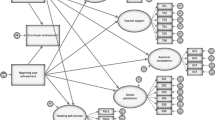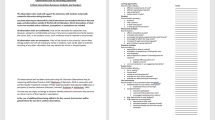Abstract
Research has consistently documented that teacher expectations influence student outcomes. These expectations are communicated via specific classroom behaviors and practices that differ substantially for high- vs. low-expectation students. Expectations, to a large extent, are a part of a personal belief system influenced by prior experience with diverse students, teachers' role definition, knowledge of appropriate strategies and techniques, and support services available. In urban schools where there are large proportions of academically at-risk students, these factors interact to determine whether or not students receive instruction necessary to improve their low achievement levels.
Similar content being viewed by others
References
Baron, R. Tom, D., and Cooper, H. (1985). Social class, race, and teacher expectations. In J. B. Dusek (Ed.),Teacher Expectancies, pp. 251–269. New Jersey: Erlbaum.
Barton, A.H., and Wilder, P.E. (1964). Research and practice in the teaching of reading: A progress report. In M.B. Miles (ed.),Innovations in Education. New York: Teachers College, Columbia University.
Brookover, W. Beady, C., Flood, P., Schweitzer, J., and Wiseenbaker, J. (1979).School Social Systems and Student Achievement: Schools Can Make a Difference. New York: Bergin.
Brophy, J. E. (1985). Teacher-student interaction. In J. B. Dusek (ed.),Teacher Expectancies, pp. 303–328. New Jersey: Erlbaum.
Brophy, J. E., and Good, T. L. (1970). Teachers' communication of differential expectations for children's classroom performance.Journal of Educational Psychology 61(5): 365–374.
Brophy, J. E., and Good, T. L. (1974).Teacher-Student Relationship: Causes and Consequences. New York: Holt.
Cooper, H. (1979). Pygmalion grows up: A model for teacher expectation communication and performance influence.Review of Educational Research 49(3): 389–410.
Cooper, H. (1985). Models of teacher expectation communication. In J. B. Dusek (ed.),Teacher Expectancies, pp. 136–158. New Jersey: Erlbaum.
Crano, W., and Mellon, P. (1978). Causal influences of teachers' expectations on children's academic performance: A cross-lagged panel analysis.Journal of Educational Psychology (70)(1): 39–49.
Erickson, F. (1977). Some approaches to inquiry in school-community ethnography.Anthropology & Education Quarterly (8): 58–69.
Good, T. L. (1981). Teacher expectations and student perceptions: A decade of research.Educational Leadership 38(5): 415–421.
Good, T. L. (1982). How teachers' expectations affect results.American Education 18(10): 25–32.
Gouldner, H. (1978).Teachers' Pets, Troublemakers and Nobodies: Black Children in Elementary Schools. Connecticut: Greenwood Press.
Johnston, P., Allington, R., and Afflerbach, P. (1985). The congruence of classroom and remedial reading instruction.Elementary School Journal 85(4): 465–477.
Kerman, S. (1979). Teacher expectations and student achievement.Phi Delta Kappan 60(10): 716–718.
Mackenzie, D. E. (1982). Research for school improvement: An appraisal of some recent trends.Educational Researcher 12(4): 5–17.
Ogbu, J. U. (1978).Minority Education and Caste: The American System in Cross-Cultural Perspective. New York: Academic Press.
Patton, M. Q. (1980).Qualitative Evaluation Methods. California: Sage.
Purkey, S. C., and Smith, M. S. (1983). Effective schools: A review.The Elementary School Journal 83(4): 427–452.
Scott-Jones, D., and Clark, M. L. (1986). The school experiences of black girls: The interaction of race and socioeconomic status.Phi Delta Kappan 67(7): 520–526.
Shavelson, R. J., and Stern, P. (1981). Research on teachers' pedagogical thoughts, judgments, decisions and behavior.Review of Educational Research 51(4): 455–498.
Smith, M. (1980). Meta analyses of research on teacher expectation.Evaluation in Education 4: 53–55.
Silverstein, B., and Krate, R. (1975).Children of the Dark Ghetto: A Developmental Psychology. New York: Praeger, 1975.
Rist, R. (1970). Student social class and teacher expectations: The self-fulfilling prophecy in ghetto education.Harvard Educational Review 40: 411–451.
Wiley, M., and Eskilson, A. (1978). Why did you learn in school today? Teachers' perceptions of causality.Sociology of Education 51: 261–269.
Venezky, R. L., and Winfield, L. F. (1979). Schools that succeed beyond expectations in teaching reading (Tech. Rep. No. 1). Newark: University of Delaware, College of Education.
Winfield, L. F. (1982). Case studies of inner-urban schools and reading achievement. Unpublished doctoral dissertation, University of Delaware.
Winfield, L. F. (1987). Teachers' estimates of test content covered in class and first grade students' reading achievement.Elementary School Journal 87(4): 437–454.
Author information
Authors and Affiliations
Rights and permissions
About this article
Cite this article
Winfield, L.F. Teacher beliefs toward academically at risk students in inner urban schools. Urban Rev 18, 253–268 (1986). https://doi.org/10.1007/BF01112132
Issue Date:
DOI: https://doi.org/10.1007/BF01112132




